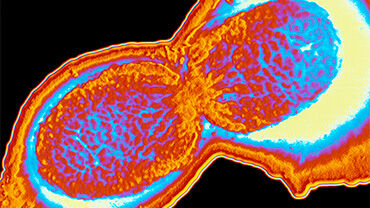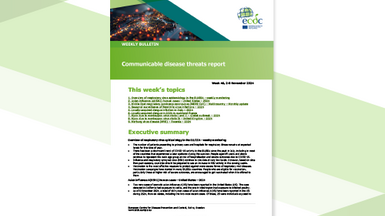Outbreak of Shigella sonnei in the EU/EEA and the United Kingdom among travellers returning from Cabo Verde
Increased numbers of shigellosis cases, mainly caused by Shigella sonnei, among travellers returning from Cabo Verde, have been reported in the EU/EEA, the United Kingdom (UK) and the United States (US) since September 2022. This outbreak evolved rapidly during November-December 2022.
As of 16 February 2023, 10 EU/EEA countries and the UK reported and the US reported 221 confirmed Shigella sonnei infections and 37 possible cases, all with a link to Cabo Verde.
Information on possible ways of infection or common exposure have not yet been identified but investigations are ongoing in Cabo Verde. Multiple modes of transmission are plausible, and the most likely way is through food, including via infected food handlers. However, person-to-person transmission is also possible.
The S. sonnei strain in the current outbreak indicates predicted resistance to trimethoprim and streptomycin but in some cases, multidrug resistance has also been detected.
Based on the available information, many cases are reported to have stayed in all-inclusive hotels located in the region of Santa Maria on the island of Sal. The most recent cases were reported in Sweden on 19 January 2023, suggesting an ongoing moderate risk of new infections among travellers to Cabo Verde, particularly among those staying in the region of Santa Maria on the Island of Sal.
Shigellosis is a gastrointestinal infection caused by one of four species of Shigella bacteria: Shigella sonnei, S. flexneri, S. boydii and S. dysenteriae. Humans are the primary reservoirs for Shigella.
Shigellosis is caught by oral contact with material contaminated by faeces, either through direct person-to-person contact, via contaminated food or water, or via objects which have been in contact with faeces. The necessary dose for infection is small, which increases transmissibility.
Food-related outbreaks are often caused by infected food handlers, who contaminate ready-to-eat food items like salads. Waterborne infection can occur if drinking or recreational water is contaminated with faeces from an infected person.
Handwashing with soap and water is important, especially after using the toilet and before preparing or eating food. Additional care with food and drinking water when travelling abroad is also important. There is no vaccine currently available to prevent Shigella infection.
People with shigellosis should not attend school, handle food, or provide child or patient care whilst ill. Children under the age of five, food handlers, and healthcare staff should stay at home for 48 hours after their symptoms have ceased.
ECDC encourages public health authorities in the EU/EEA to increase awareness among healthcare professionals on the possibility of Shigella infections among people that recently travelled to Cabo Verde.
Together with WHO/Europe, ECDC is in regular contact with authorities in Cabo Verde to support investigations on the sources of infection and to increase awareness among healthcare professionals in the country.
Number of cases, demographic information, and temporal occurrence of 258 confirmed and possible Shigella sonnei cases in 10 EU/EEA countries, the UK, and the US, as of 16 February 2023
|
Country |
Total number of cases |
Confirmed cases (since 1 November 2021) |
Possible cases (since 1 September 2022) |
|---|---|---|---|
|
Belgium |
14 |
14 |
0 |
|
Czechia |
4 |
4 |
0 |
|
Denmark |
4 |
2 |
2 |
|
Finland |
9 |
8 |
1 |
|
France |
31 |
31 |
0 |
|
Germany |
5 |
4 |
1 |
|
Netherlands |
47 |
34 |
13 |
|
Norway |
1 |
1 |
0 |
|
Portugal |
2 |
2 |
0 |
|
Sweden |
42 |
22 |
20 |
|
Total EU/EEA |
159 |
122 |
37 |
|
United Kingdom |
95 |
95 |
0 |
|
United States |
4 |
4 |
0 |
|
Total |
258 |
221 |
37 |







